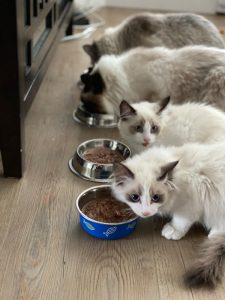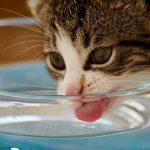Feeding and Nutrition for Kittens in Cat Boarding

As someone who had to board their first cat around Brisbane, I have learned much about keeping kittens well fed during their stays. Good nutrition helps kittens stay healthy and happy while away from home. Let me share some helpful tips about feeding young cats in boarding.
Maintaining home diets reduces tummy troubles. I always pack enough of our regular food for the whole stay. Good facilities welcome this approach. They understand that diet changes can upset young stomachs.
Proper food storage keeps meals fresh and safe. Quality facilities have cool, dry storage areas for food. They keep each cat food separate and clearly labeled. Staff check food freshly daily for any problems.
Feeding schedules match home routines. Tell staff about your normal meal times at home. Good places try to feed kittens at these same times. This helps young cats feel more secure during their stay.
 Small, frequent meals work best for kittens. Most good facilities feed young cats three or four times daily. They give appropriate portions for each age group. Staff monitor that kittens eat all their food.
Small, frequent meals work best for kittens. Most good facilities feed young cats three or four times daily. They give appropriate portions for each age group. Staff monitor that kittens eat all their food.
Fresh water needs constant attention. Staff should check water bowls many times each day. They clean and refill bowls regularly. Most places use water fountains for curious kittens.
Treats help worried kittens adjust to boarding. Pack some favorite treats from home. Good staff use these to encourage shy kittens to eat. They also help build trust with nervous young cats.
Special diets need clear instructions. Write down exact portions and mixing details. Include any food allergies or restrictions. Good facilities follow feeding instructions carefully.
Measuring food ensures proper portions. Staff should use proper measuring tools. They record amounts eaten at each meal. This helps track kitten appetite during their stay.
Wet food needs careful handling. Good facilities store opened wet food properly. They only keep it for safe time periods. Most places prefer single serve containers.
Different feeding areas suit different kittens. Some like eating up high, others prefer floor level. Good staff notice these preferences. They adjust feeding spots to make kittens comfortable.
Food bowls need regular cleaning. Staff wash bowls after every meal. They check for any damage or rough edges. Most places use ceramic or stainless steel bowls.
 Monitoring eating habits spots problems early. Staff watch how kittens approach their food. They note any changes in eating patterns. Good places contact owners about appetite concerns.
Monitoring eating habits spots problems early. Staff watch how kittens approach their food. They note any changes in eating patterns. Good places contact owners about appetite concerns.
Some kittens share feeding spaces. Staff supervise shared meal times carefully. They ensure each kitten gets proper food amounts. Most places separate aggressive eaters.
Supplements need special attention. Pack any vitamins or supplements clearly labeled. Include instructions about when to give them. Good facilities record all supplement doses.
Extra food helps handle emergencies. Pack a few extra days of food just in case. This helps if stays need extending. Most places appreciate this preparation.
Exercise timing affects feeding schedules. Staff plan play sessions between meals. This prevents tummy upsets from active play. Good places know proper meal spacing.
Weight tracking helps monitor health. Many facilities weigh kittens weekly during stays. They record any significant changes. Most places share this information with owners.
Some kittens need feeding encouragement. Staff might hand feed nervous kittens. They try different spots or bowls to help. Good places know many tricks to encourage eating.
Temperature affects kitten appetites. Facilities keep food areas at comfortable temperatures. They avoid putting food in hot or cold spots. Most places monitor room temperatures regularly.
Feeding times create bonding opportunities. Good staff talk to kittens during meals. They use this time to check general health. Most kittens learn to trust staff during feeding.
Remember that each kitten has unique needs. Good facilities adjust feeding plans for individuals. They stay flexible with meal timing and amounts. Proper feeding keeps kittens healthy during boarding stays.